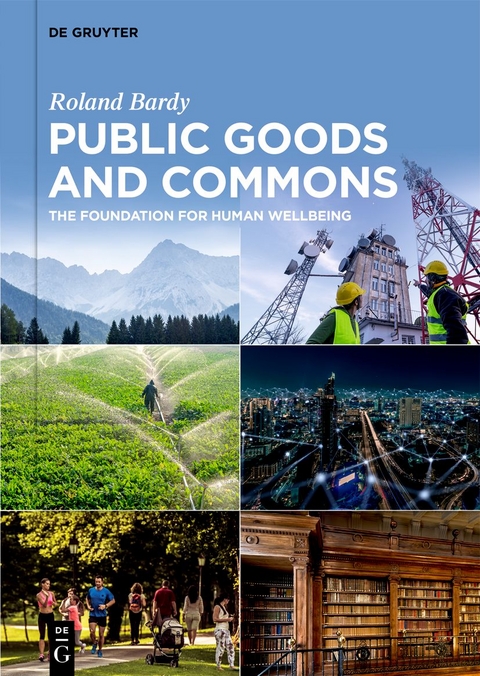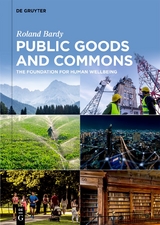Public Goods and Commons
De Gruyter (Verlag)
978-3-11-113252-5 (ISBN)
Humans and human wellbeing depend on the natural resources provided by Planet Earth, and they depend on the solidarity between human beings. That is, on the social resources provided by society. Both types of resources are available to everyone: they are public goods. The book approaches the topic from various angles, including the often-neglected dimension of measuring. It offers a holistic conception that covers the macro- and the micro-economic, the political and the developmental aspects. It shows which range of action is available at different levels of decision-making and which outcomes these may provide. And it emphasizes that a philosophical base is needed for understanding and managing the topic, and that wellbeing can only be improved and the common good can only be maintained if the public and the private sectors cooperate. With the advent of the United Nations' sustainable development goals, this cooperation has received momentum in all its facets and for all levels - from the local to the global.
The book is aimed both at scholars and students as well as practitioners in businesses and in public service. In academia, it may serve as a companion to textbooks on, e.g., public finance, sustainable development, social affairs, and public-private partnerships, both in undergraduate and graduate levels. For professionals in businesses and in public service, the book offers an insight into the topic that does not recur to an academic language. There is always a need for books that appeal both to readers who are managers as well as to scholars who wish to glance beyond their adopted profession.
lt;p>Dr. Roland Bardy is owner of BardyConsult in Mannheim, Germany, where he mainly engages in management education. Prior to this, he worked at BASF SE, the German multinational, for about thirty years until 1999. Then he took up teaching at Goizueta Busjness School (Emory University) in Atlanta. He had various other assignments in the U.S., Germany, Austria, and Switzerland, with the last one being Executive Professor at Florida Gulf Coast University, Fort Myers.
Introduction
Chapter 1: Defining public goods and commons
Chapter 2: Typologies of public goods and commons
Chapter 3: Sources for providing public goods and commons
Chapter 4: Policy making and managing
Chapter 5: The global level revisited: Public goods in the SDGs
Conclusion: Businesses, individuals and state actors collaborating for public goods and human wellbeing
This book provides an expansive review of the public goods/commons theme and highlights the inherent linkage between public goods provision and human wellbeing. Scholars, policy makers and business leaders will benefit from the author's stance on how collaborative efforts of the state and the private sector promote the current and future welfare of societies. In my opinion, the book will lead to rewarding discussions between decision makers, and it will induce performance improvements.
- Jürgen Strube, Honorary Chairman and ex-CEO of BASF SE
The book serves the purpose of framing and shaping the academic and political discourse on the provision and the use of public goods/commons. It provides a clear and accessible understanding of how to strike the best approach towards balancing economic and societal vitality today with preserving mankind's resources for future generations. This conversation matters the more when viewing the consequences of the COVID pandemic, the Russian warmongery and the ruptures that threaten our world order.
- Roland Koch, Frankfurt School of Finance and Management, former Governor of Hesse
The provision of public goods is vital for the sustainability of individuals and societies. The role of "the commons" in political economy is much misunderstood. This book provides an excellent basis for discussions, policies, and the furtherance of research on ways forward in debate and action on the mechanisms of delivery of public goods to enhance well-being.
- Peter J Buckley, OBE, FBA, Alliance Manchester Business School, University of Manchester
This is a must-read for anyone involved in policymaking - whether on the local, the state, the national or the global level. Actions of politicians, as the author points out, influence public goods and wellbeing anywhere, and since all public goods are intertwined, all areas of human development are impacted worldwide. Positive impacts are driven by ethics. This is shown by the book and lived every day at the Wittenberg Center for Global Ethics, which I co-founded and where I met the author. The meaning of "global" is that decisions, wherever they are made, may cause worldwide repercussions.
- Andrew Young, former Ambassador of the US to the United Nations, former mayor of Atlanta
| Erscheinungsdatum | 04.12.2023 |
|---|---|
| Zusatzinfo | 10 b/w and 6 col. ill., 14 b/w tbl. |
| Verlagsort | Berlin/Boston |
| Sprache | englisch |
| Maße | 170 x 240 mm |
| Gewicht | 532 g |
| Themenwelt | Wirtschaft ► Betriebswirtschaft / Management ► Unternehmensführung / Management |
| Wirtschaft ► Volkswirtschaftslehre | |
| Schlagworte | Collective effort • Eigentumsrechte • Nachhaltige Entwicklung • Natural Environment • natural resources • Natürliche Ressourcen • Öffentlich Private Partnerschaften • property rights • Public Finance • Public-private Partnerships • Social capital • Sozialkapital • sustainable development • Umwelt |
| ISBN-10 | 3-11-113252-8 / 3111132528 |
| ISBN-13 | 978-3-11-113252-5 / 9783111132525 |
| Zustand | Neuware |
| Haben Sie eine Frage zum Produkt? |
aus dem Bereich




